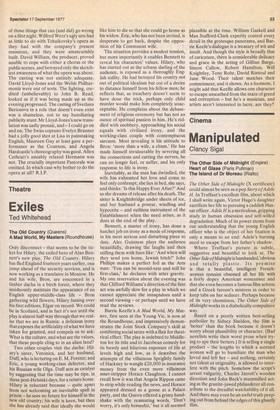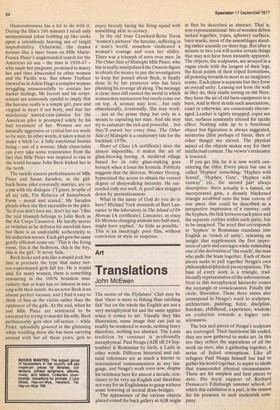Cinema
Manipulated
Clancy Sigal
The Other Side of Midnight (Empire) Heart of Glass (Paris Pullman) The island of Dr Moreau (Rialto) The Other Side of Midnight (X certificate) could almost be seen as a pop Story of Adele H. In Truffaut's excellent film, about which I shall write again, Victor Hugo's daughter sacrifices her life to pursuing a caddish Hussar officer. Adele His a meticulous, gripping study in human obsession and self-willed degradation. Much of its power stems from our understanding that the young English officer who is the object of her fixation is only a means to an end: Adele's burning need to escape from her father's shadow.
Where Truffaut's picture is subtle, suggestive and beautiful to look at, The Other Side of Midnight is hamhanded,'obvious and totally plastic. Its premise is that a beautiful, intelligent Frenchwoman remains obsessed all her life with a fairly dopey American womaniser and that she even becomes a famous film actress and a Greek tycoon's mistress in order to keep tabs on her seducer. Perhaps because of its very clumsiness, The Other Side of Midnight works in a diabolically compulsive way.
Based on a poorly written best-selling potboiler by Sidney Sheldon, the film is 'better' than the book because it doesn't worry about plausibility or character. (Bad novelists write their worst prose when trying to ape their betters.) It is selling a single product — the lengths to which a scorned woman will go to humiliate the man who loved and left her — and nothing, certainly not talent or originality, is allowed to interfere with the pitch. Somehow the script's arrant vulgarity, Charles Jarrott's wooden direction and John Beck's mummified acting as the granite-jawed philanderer all contribute to the dreadful watchability of it all. And there may even be an awful truth peeping out from behind the edges of this ghastly film. Humourlessness has a lot to do with it. During the film's 166 minutes I recall only unintentional jokes bobbing up like corks upon a relentlessly heaving sea of turgid improbability. Otherwise, the drama focuses like a laser beam on Mlle MarieFrance Pisier's singleminded search for the American air ace — the time is 1939-47 — who made her pregnant, promised to marry her and then absconded to other women and the Pacific war. But where Truffaut showed us in Adele Hugo a complex woman struggling unsuccessfully to contain her darker feelings, Mr Jarrott and his scriptwriters are extremely careful to imply that the heroine really is a simple girl, pure and virginal in heart if not body, and that her murderous hatred-cum-passion for the American pilot is prompted solely by his bad treatment of her. Women are not naturally aggressive or cynical but are made so by men. In other words, it takes a man to make a bitch i.e. a fully emotional human being — out of a woman. Male chauvinists can even take some reassurance from the fact that Mlle Pisier was inspired to rise in the world because John Beck kicked her in the teeth, The tackily sincere performances of Mlle Pisier and Susan Saradon, as the girlback-home pilot eventually marries, are on a par with the dialogue. ('I guess, in spite of all my talk, I'm Rebecca of Sunnybrook Farm — moral and scared,' Ms Saradon pleads when she first succumbs to the pilot. 'So if you don't love me, don't lay me.') But the real triumph belongs to John Beck as the Air Corps Casanova. He hardly moves or twitches as he delivers his mawkish lines but there is an undeniable authenticity to his seduction scenes. Each girl gets the same gently efficient come-on: 'This is the living room, this is the bedroom, this is the boy, this is the girl.' It never fails.
Beck looks and acts like a stupid jock but that is precisely the type that many nottoo-experienced girls fall for. He is stupid and, for many women, there is something reassuring in the 100% brainless masculinity that at least has no interest in messing with their minds. As an actor Beck is an almost perfect vacuum, and I find it easy to think of him as the victim rather than the oppressor of the girls. At the end, when he and Mlle Pisier are sentenced to be executed for trying to murder his wife, Beck perfunctorily gets shot off-screen — while Pisier, splendidly gowned in the glistening white wedding dress she has been carrying around with her all these years, gets to enjoy bravely facing the firing squad with something akin to ecstacy.
In the old Joan Crawford-Bette Davis 'women's pictures' the heroine, suffering in a man's world, somehow vindicated a woman's courage and even her ability. There was a triumph of sorts over men. In The Other Side of Midnight Mlle Pisier, who has sexually manipulated the Onassis-figure to obtain the money to pay the investigators to keep her posted about Beck, is finally done in by her protector who has been planning his revenge all along. The message is clear: men still control the world in which women may manoeuvre but rarely come out on top. A woman may love. . .but only obsessionally, irrationally. She may work. . .not as the prime thing but only as a means to capturing her man. And she may try to outsmart the rich and powerful. . .but they'll outwit her every time. The Other Side of Midnight is a cautionary tale for the backlash 1970s.
Heart of Glass (A certificate) does the almost impossible, it makes the art of glass-blowing boring. A medieval village famed for its ruby glass-making goes berserk when it loses the formula. Publicity suggests that the director, Werner Herzog, hypnotised the actors to obtain the correct degree of sleepwalking intensity. He succeeded only too well. A good idea dragged down by pretentiousness.
What in the name of God do you do in here? Michael York demands of Burt Lancaster in the laboratory in The Island of Dr Moreau (A certificate). Lancaster, as crazy Dr Moreau changing animals into half-men, might have replied, 'As little as possible.' This is an insultingly poor film, without conviction or style or suspense.































 Previous page
Previous page